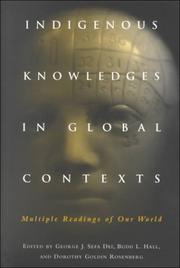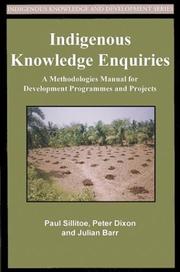| Listing 1 - 10 of 224 | << page >> |
Sort by
|
Book
ISBN: 9838618365 9789838618366 Year: 2015 Publisher: Pulau Pinang, Malaysia : Penerbit Universiti Sains Malaysia,
Abstract | Keywords | Export | Availability | Bookmark
 Loading...
Loading...Choose an application
- Reference Manager
- EndNote
- RefWorks (Direct export to RefWorks)
Book
ISBN: 9838618357 9789838618359 Year: 2015 Publisher: Pulau Pinang, Malaysia : Penerbit Universiti Sains Malaysia,
Abstract | Keywords | Export | Availability | Bookmark
 Loading...
Loading...Choose an application
- Reference Manager
- EndNote
- RefWorks (Direct export to RefWorks)
Periodical
ISSN: 25382543 Year: 1393 Publisher: Tihrān : Intishārāt-i Dānishgāh-i ʻAllāmah Ṭabāṭabāʼī,
Abstract | Keywords | Export | Availability | Bookmark
 Loading...
Loading...Choose an application
- Reference Manager
- EndNote
- RefWorks (Direct export to RefWorks)
Book
ISBN: 9789956552559 9956552550 Year: 2022 Publisher: Oxford : Langaa RPCIG,
Abstract | Keywords | Export | Availability | Bookmark
 Loading...
Loading...Choose an application
- Reference Manager
- EndNote
- RefWorks (Direct export to RefWorks)
This book is on the re-imagination of Indigenous Knowledge Systems (IKS) and practices in 21st century Africa.

ISBN: 9780802080592 0802042007 9780802042002 0802080596 Year: 2000 Publisher: Toronto: University of Toronto press,
Abstract | Keywords | Export | Availability | Bookmark
 Loading...
Loading...Choose an application
- Reference Manager
- EndNote
- RefWorks (Direct export to RefWorks)
Book
Year: 2008 Publisher: Göttingen : Universitätsverlag Göttingen,
Abstract | Keywords | Export | Availability | Bookmark
 Loading...
Loading...Choose an application
- Reference Manager
- EndNote
- RefWorks (Direct export to RefWorks)
How are biological diversity, protected areas, indigenous knowledge and religious worldviews related? From an anthropological perspective, this book provides an introduction into the complex subject of conservation policies that cannot be addressed without recognising the encompassing relationship between discursive, political, economic, social and ecological facets. By facing these interdependencies across global, national and local dynamics, it draws on an ethnographic case study among Maya-Q'eqchi' communities living in the margins of protected areas in Guatemala. In documenting the cultural aspects of landscape, the study explores the coherence of diverse expressions of indigenous knowledge. It intends to remind of cultural values and beliefs closely tied to subsistence activities and ritual practices that define local perceptions of the natural environment. The basic idea is to illustrate that there are different ways of knowing and reasoning, seeing and endowing the world with meaning, which include visible material and invisible interpretative understandings. These tend to be underestimated issues in international debates and may provide an alternative approach upon which conservation initiatives responsive to the needs of the humans involved should be based on.
Anthropology. --- Ethnoscience. --- Biodiversity conservation.
Book
ISBN: 177142298X 9781771422987 9781550927023 1550927027 0865719098 Year: 2019 Publisher: New Society Publishers
Abstract | Keywords | Export | Availability | Bookmark
 Loading...
Loading...Choose an application
- Reference Manager
- EndNote
- RefWorks (Direct export to RefWorks)
"In Changing Tides, Alejandro Frid, an ecologist working with Indigenous people, argues that a merger of scientific perspectives and Indigenous knowledge might just help us change the story we tell ourselves of who we are--of who we can be--and steer us towards a more benign Anthropocene"--Provided by publisher.
Anthropology --- Social science --- Ethnoscience.
Book
Year: 2008 Publisher: Göttingen : Universitätsverlag Göttingen,
Abstract | Keywords | Export | Availability | Bookmark
 Loading...
Loading...Choose an application
- Reference Manager
- EndNote
- RefWorks (Direct export to RefWorks)
How are biological diversity, protected areas, indigenous knowledge and religious worldviews related? From an anthropological perspective, this book provides an introduction into the complex subject of conservation policies that cannot be addressed without recognising the encompassing relationship between discursive, political, economic, social and ecological facets. By facing these interdependencies across global, national and local dynamics, it draws on an ethnographic case study among Maya-Q'eqchi' communities living in the margins of protected areas in Guatemala. In documenting the cultural aspects of landscape, the study explores the coherence of diverse expressions of indigenous knowledge. It intends to remind of cultural values and beliefs closely tied to subsistence activities and ritual practices that define local perceptions of the natural environment. The basic idea is to illustrate that there are different ways of knowing and reasoning, seeing and endowing the world with meaning, which include visible material and invisible interpretative understandings. These tend to be underestimated issues in international debates and may provide an alternative approach upon which conservation initiatives responsive to the needs of the humans involved should be based on.
Anthropology. --- Ethnoscience. --- Biodiversity conservation.
Book
ISBN: 1443893137 9781443893138 1443890669 9781443890663 Year: 2016 Publisher: Newcastle upon Tyne, England : Cambridge Scholars Publishing,
Abstract | Keywords | Export | Availability | Bookmark
 Loading...
Loading...Choose an application
- Reference Manager
- EndNote
- RefWorks (Direct export to RefWorks)
In the light of the globalization, (post-)modernization, social fragmentation, and economization of many of today's living contexts, local knowledge is receiving increasing attention in various sciences. Commonly, local knowledge indicates a counterpart to both rational forms of an explicit knowledge of facts and knowledge of universal validity. Local knowledge attempts to appreciate a more comprehensive view of people's skills, capabilities, experience, and sophistication. On the other hand, the reference to 'local' implies an idea of bounded applicability of knowledge in a specific environment. Beyond this scope of application, local knowledge can be acknowledged either as instrumental in order to achieve specific goals or as an intrinsic value in order to deal with social relations, solidarity, common values and norms accordingly. Social and spatial settings are influential for everybody's quality of life, personal identity, and political commitment - and local knowledge is the essential foundation in turning these settings into a vivid arena. This volume is a result of a two-day conference held in November 2013 in Salzburg, Austria, dedicated to bringing together researchers from different scientific disciplines, including sociology, philosophy, social geography, economics, history, interpersonal communication studies, cultural studies, and theology, in order to draw distinct trains of thought about local knowledge in a transdisciplinary fashion: the phenomenon, its epistemic and philosophical reflection, its methodological comprehension, and its practical application.

ISBN: 1853395714 9781853395710 Year: 2006 Publisher: Warwickshire Practical Action publishing
Abstract | Keywords | Export | Availability | Bookmark
 Loading...
Loading...Choose an application
- Reference Manager
- EndNote
- RefWorks (Direct export to RefWorks)
| Listing 1 - 10 of 224 | << page >> |
Sort by
|

 Search
Search Feedback
Feedback About UniCat
About UniCat  Help
Help News
News